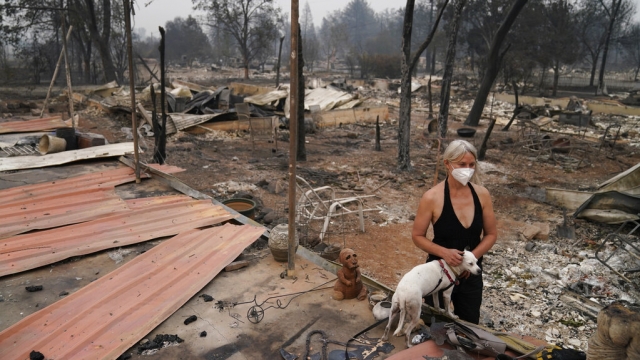Wildfires are blazing around the world — from Spain to Canada, Texas and, most recently, Hawaii, where flames killed more than 100 people in Maui.
While it's clear that these disasters displace tons of people, they also displace pets, with hundreds lost, injured or dead in Maui. As humans have been affected mentally and physically, so have their animals, many of which have been showing up to Maui shelters with severe burns.
Here are all the ways wildfires can affect pets, and how you can prepare for the impact.
Physical effects of wildfires on pets
Wildfires carry an obvious risk of burning animals themselves, but the flames can also burn down these pets' habitats, leaving lost animals to fend for themselves in dangerous or foreign environments.
According to Colleen Lambo, a veterinarian with The Vets, the destruction of natural habitats for wildlife populations also can also lead to dangerous encounters or conflicts between displaced animals and pets, which can also increase the risk of disease transmission.
And just as smoke inhalation can have harsh physical effects on humans, dogs can suffer from wildfire smoke, too.
Lambo says wildfire smoke contains harmful particles and chemicals that can irritate an animal's respiratory system. This can cause similar effects as humans can experience, such as difficulty breathing, coughing, wheezing and other issues due to prolonged smoky air exposure.
Then in the aftermath of a wildfire, there's often a disruption in finding food and clean water for humans and pets, especially if the animals get separated from their owners. If they're finding nourishment in the environment, they could be ingesting or brushing up with contaminated water, ash, debris and other pollutants.
These pets who would need veterinary care after the fires can sometimes struggle even getting that, as shelters and clinics can be overwhelmed with displaced animals which would exhaust their resources.
SEE MORE: Here's how you can help Maui residents amid deadly wildfires
Mental effects of wildfires on pets
The stress wildfires inflict on humans in the fire zone can spread into the minds of their animals, too.
Take evacuations, for example. Humans are rapidly trying to leave the affected areas, and in the midst of the chaos, pets can become disoriented and frightened. They can also sense a human's stress, Lambo said, which can exacerbate their own anxiety.
And that's if they're taken with their owners; a pet left behind faces another load of stress.
These sudden changes and times of upheaval, Lambo said, can cause emotional trauma, leading to anxiety and behavioral issues. Separation from owners, loss of familiar surroundings and exposure to frightening and unfamiliar situations can all prompt this trauma.
How you can mitigate the effects of wildfires on pets
Though you can't stop a wildfire from happening, you can take some precautions to reduce the risks they have on you and your pets.
Those who aren't as much in a wildfire's path but are still hit by wildfire side effects, like smoke, should reduce the amount of time pets are outside for bathroom breaks or walks, particularly if air quality alerts are in effect.
Humans may often have emergency plans and kits, but Lambo says it's important to include your pets in these as well. That means keeping their essentials in your packs, like their food, medications, crates and comfort items.
Lambo also says it's vital to give your pets proper identification collars, tags or microchips to ensure they can be reunited with you if separated.
And in the last resort event where you really can't bring your pets with you, don't put them in a crate. Put them in a safe area with access to food, water and an escape route.
Trending stories at Scrippsnews.com



